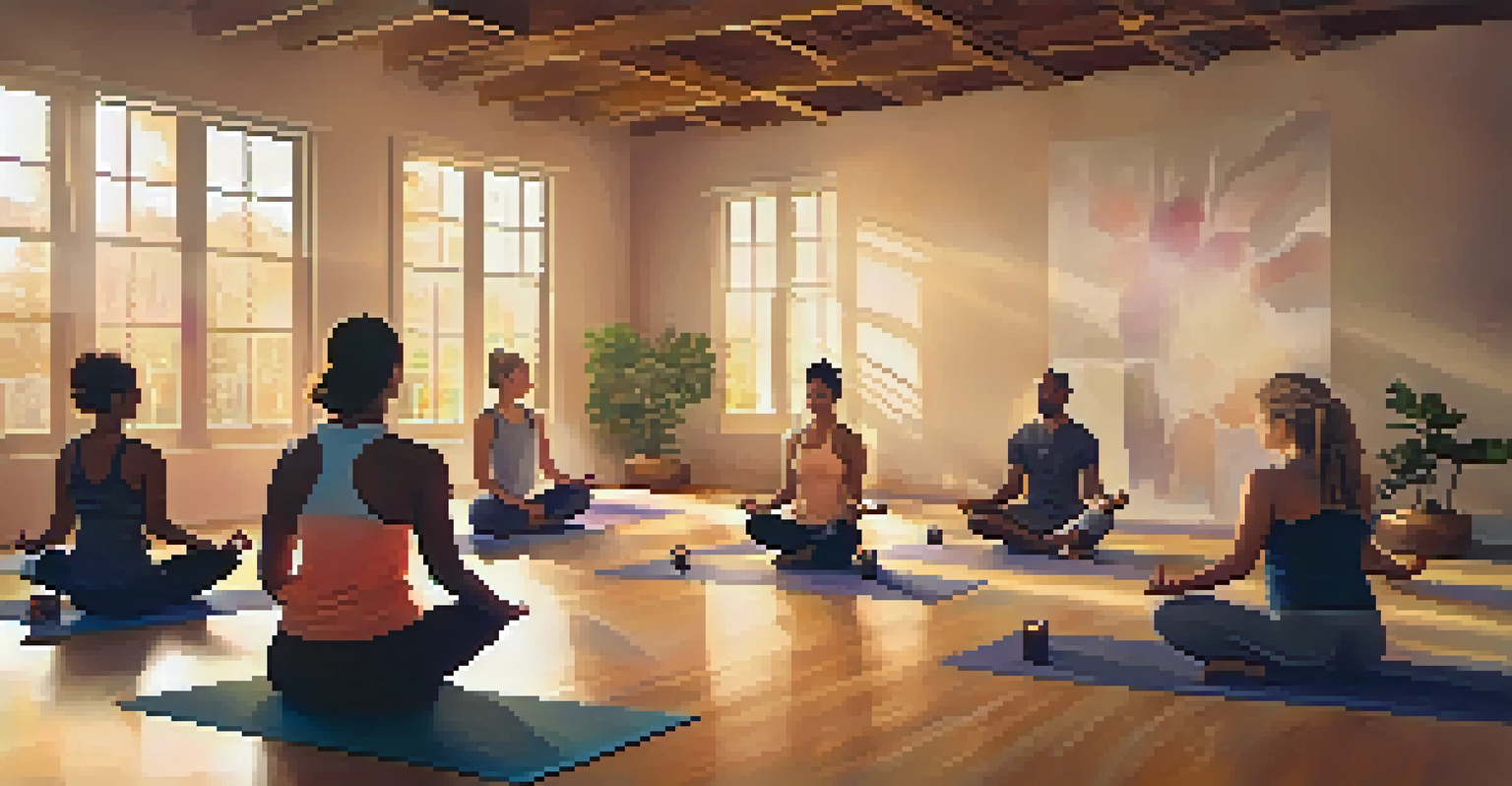How Yoga Practices Contribute to Mental and Emotional Resilience

Understanding Mental and Emotional Resilience
Mental and emotional resilience refers to our ability to adapt to stress, adversity, and uncertainty. It’s like the mental muscle that helps us bounce back from tough times. Just as we train our bodies to lift heavier weights, we can also train our minds to handle life’s ups and downs more effectively.
It's not the load that breaks you down, it's the way you carry it.
In a world that often feels overwhelming, resilience can serve as a crucial buffer against anxiety and depression. It’s not about being immune to challenges; rather, it’s about developing the skills to cope and thrive despite them. This is where yoga comes into play, offering tools to enhance our mental fortitude.
By practicing yoga, we cultivate a mindset that embraces change and uncertainty. This shift in perspective can significantly improve our overall well-being, making resilience not just a goal, but a way of life.
The Role of Breath in Yoga and Resilience
In yoga, breath is more than just a physical act; it's a powerful tool for emotional regulation. The practice of pranayama, or breath control, allows us to connect our mind and body, fostering a state of calmness even in stressful situations. Think of it as a reset button that helps us manage our emotional responses.

When we focus on our breath, we create space for clarity and mindfulness. This practice encourages us to pause and reflect before reacting to stressors, leading to more thoughtful responses rather than knee-jerk reactions. Over time, this can enhance our emotional resilience significantly.
Resilience Through Yoga Practice
Yoga helps individuals build mental and emotional resilience by providing tools to adapt to stress and adversity.
By incorporating breathwork into our daily routine, we not only improve our yoga practice but also equip ourselves with a valuable skill to handle life’s challenges. It’s like having an emotional toolkit at our fingertips, ready to use whenever we need it.
Mindfulness and Its Impact on Emotional Strength
Yoga encourages mindfulness, which is the practice of being present in the moment without judgment. This focus on the 'now' helps us recognize our thoughts and emotions as they arise, allowing us to respond rather than react. It’s a bit like watching clouds pass by; we can observe without getting overwhelmed by them.
The greatest weapon against stress is our ability to choose one thought over another.
By engaging in mindfulness during yoga, we learn to accept our feelings rather than suppress them. This acceptance fosters emotional strength, as we become more comfortable with discomfort. As we practice this skill, we gradually build the resilience needed to face life's inevitable challenges.
Incorporating mindfulness into our daily lives outside of yoga can further enhance our emotional resilience. Simple practices, like mindful eating or taking a few deep breaths during a stressful moment, can have a profound impact on how we navigate our emotions.
Building a Positive Mindset Through Yoga
Yoga promotes a positive mindset by encouraging self-compassion and acceptance. When we step onto the mat, we create a space to explore our thoughts and feelings without judgment. This practice helps us develop a kinder relationship with ourselves, which is essential for building resilience.
Through consistent practice, we learn to celebrate small victories and progress rather than focusing solely on perfection. This shift in perspective can transform how we face challenges, turning setbacks into opportunities for growth. It’s like learning to dance in the rain rather than waiting for the storm to pass.
Breathwork Enhances Emotional Control
Incorporating breath control techniques in yoga fosters calmness and improves our ability to manage emotional responses.
A positive mindset doesn’t mean ignoring difficulties; it means approaching them with hope and confidence. Yoga helps us cultivate this mindset, equipping us to handle life’s twists and turns with grace.
The Community Aspect of Yoga and Resilience
Yoga is often practiced in a group setting, fostering a sense of community and support. This connection with others can be incredibly beneficial for our emotional resilience. Sharing experiences and challenges with fellow yogis creates a network of encouragement that reinforces our ability to cope with adversity.
In a supportive yoga community, we feel less isolated in our struggles. Knowing that others are facing similar challenges can provide comfort and strength. It’s like having a cheerleading squad that lifts us up when we need it most.
Moreover, the bonds we create through shared practice can lead to lasting friendships that extend beyond the yoga mat. This sense of belonging is a vital component of emotional resilience, reminding us that we are not alone on our journey.
Yoga as a Tool for Stress Reduction
One of the most significant benefits of yoga is its ability to reduce stress. The combination of physical postures, breathwork, and meditation creates a holistic approach to managing stress levels. Think of yoga as a gentle massage for your mind and body, helping to release tension and promote relaxation.
Regular yoga practice can lower cortisol levels, the hormone associated with stress, leading to improved mood and emotional stability. By making yoga a part of our routine, we develop a proactive approach to stress management, equipping ourselves to handle life’s pressures with a sense of calm.
Mindfulness Builds Strength
Practicing mindfulness during yoga allows us to accept our emotions, leading to greater emotional strength and resilience.
As we learn to navigate stress more effectively through yoga, we build resilience that extends into all areas of life. This newfound strength can empower us to face challenges head-on, rather than shrinking away from them.
Creating a Sustainable Yoga Practice for Resilience
To truly reap the benefits of yoga for mental and emotional resilience, consistency is key. Establishing a sustainable practice doesn’t mean spending hours on the mat every day; even short, regular sessions can make a significant difference. It’s about finding what works for you and making it a priority.
Consider exploring different styles of yoga to find the one that resonates with you. Whether it’s a gentle Hatha class or a more vigorous Vinyasa flow, the important thing is to enjoy the process. Like any skill, the more you practice, the more resilient you become.

Incorporating yoga into your daily routine can be as simple as dedicating a few minutes each day to stretch, breathe, or meditate. Over time, these small efforts can accumulate, leading to profound changes in how you handle life's challenges.